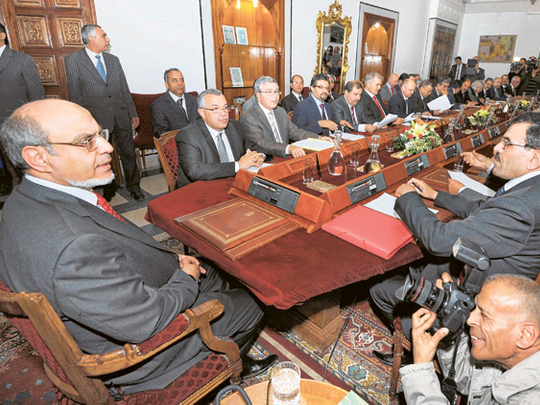
Manama: "If Al Nahda remains true to its pledge, we will have an exceptionally wonderful year in 2012," Kamal Dhib said as he pointed to the large TV screen showing debates at the Tunisian constitutional assembly over the government's action plan for next year.
According to the political analyst, Tunisia is facing a watershed moment as it moves from a phase of working towards launching new robust constitutional institutions to the phase of working through them.
The main protagonist will be Al Nahda, the moderate Islamist party that won the national elections on October 23, clinching 89 of the constituent assembly's 217 seats.
"When we heard and read about the plans the Al Nahda-led government has for 2012, we said their implementation would truly move Tunisia forward, and in a vibrant manner.
"The problem now is to see whether it was only talk by the government to win the people's support or a genuine determination to confront problems and seek to establish new political, economic and social conditions that are palatable to the people," Dhib said.
Iron fist
The year 2011 began with confrontations between a regime that was hell-bent on maintaining its iron fist on every facet of the country and protesters who were so frustrated that they wanted a change in the helm.
Two weeks into the new year and Zine Al Abidine Bin Ali, who had ruled for 23 years, left Tunisia. It was the first time in the history of any Arab country that a leader was ousted following a public protest, not a military coup. The event and its consequences overwhelmingly dominated Tunisia in 2011.
By getting rid of one of the most repressive regimes in the Arab world, Tunisians stunned themselves and the world.
Elation was, however, replaced by fear when the country risked sliding into chaos as police forces withdrew from streets and supporters of the fallen regime attempted a comeback.
Yet, within weeks, the second government, headed by Beji Caid Essebsi, a veteran politician, restored calm and the country started to function properly again, establishing pro-democracy commissions and setting up an election date for a constituent assembly.
A real feat. One year ago, nothing presaged such a development.
‘Not rosy'
"But, we need to work harder now to ensure a historic 2012," Manoubi Marrouki, an editor and political analyst, said from Tunis. "The situation is not rosy, and there is a lot of work to do. Promises and rhetoric will not get us far. We need genuine partners and we need to charter our ways wisely."
Earlier this month, Tunisia's outgoing finance minister warned that the country's budget deficit was likely to widen to at least six per cent of the GDP next year. The government needs to prevent it widening further so that it could protect its investment-grade credit rating, he warned.











